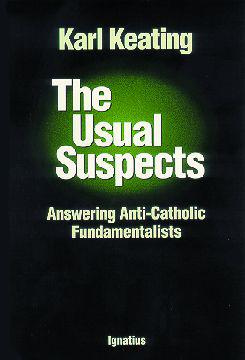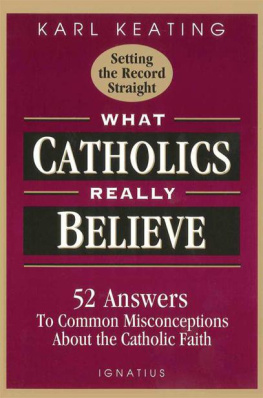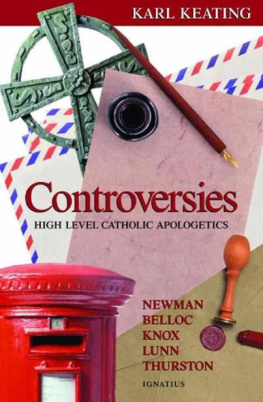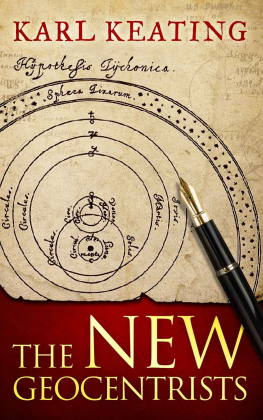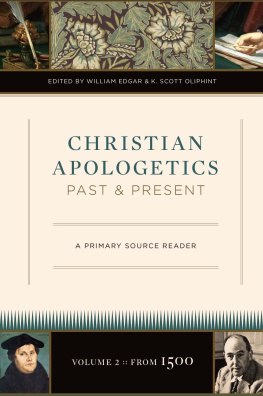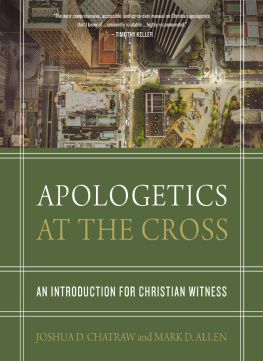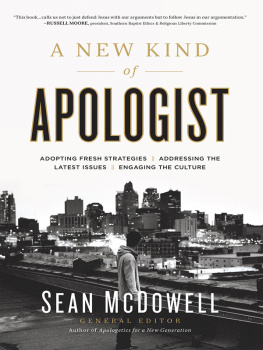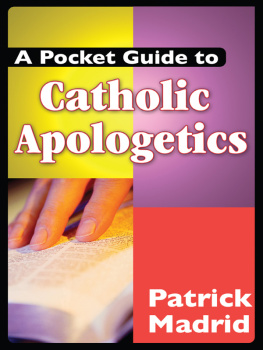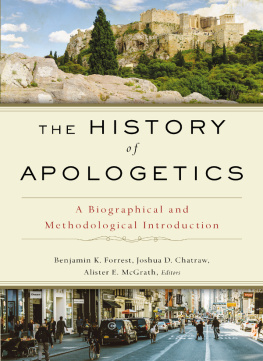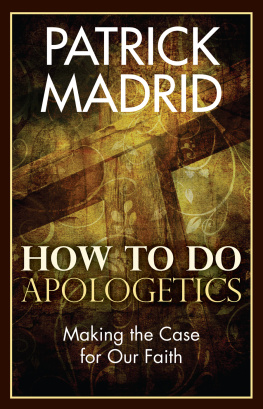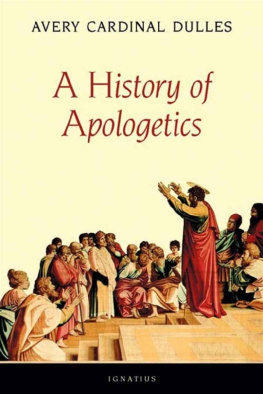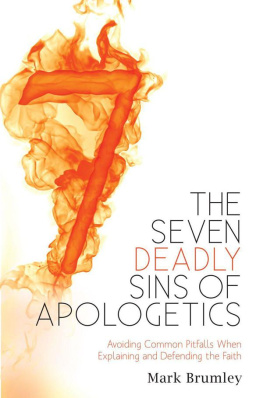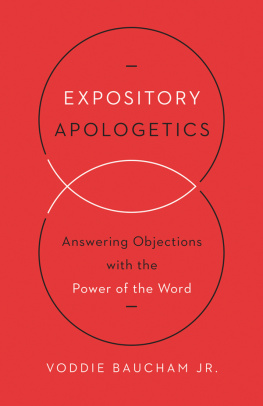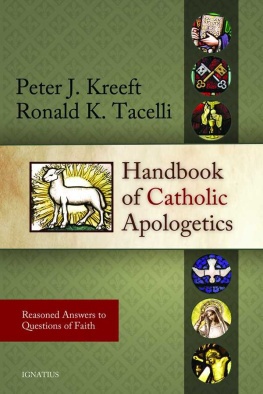Karl Keating - No Apology
Here you can read online Karl Keating - No Apology full text of the book (entire story) in english for free. Download pdf and epub, get meaning, cover and reviews about this ebook. year: 2014, publisher: Rasselas House, genre: Religion. Description of the work, (preface) as well as reviews are available. Best literature library LitArk.com created for fans of good reading and offers a wide selection of genres:
Romance novel
Science fiction
Adventure
Detective
Science
History
Home and family
Prose
Art
Politics
Computer
Non-fiction
Religion
Business
Children
Humor
Choose a favorite category and find really read worthwhile books. Enjoy immersion in the world of imagination, feel the emotions of the characters or learn something new for yourself, make an fascinating discovery.
- Book:No Apology
- Author:
- Publisher:Rasselas House
- Genre:
- Year:2014
- Rating:5 / 5
- Favourites:Add to favourites
- Your mark:
- 100
- 1
- 2
- 3
- 4
- 5
No Apology: summary, description and annotation
We offer to read an annotation, description, summary or preface (depends on what the author of the book "No Apology" wrote himself). If you haven't found the necessary information about the book — write in the comments, we will try to find it.
No Apology — read online for free the complete book (whole text) full work
Below is the text of the book, divided by pages. System saving the place of the last page read, allows you to conveniently read the book "No Apology" online for free, without having to search again every time where you left off. Put a bookmark, and you can go to the page where you finished reading at any time.
Font size:
Interval:
Bookmark:
Karl Keating

Copyright 2014 Karl Keating
All rights reserved. No part of this work may be reproduced, stored in a retrieval system, or transmitted in any form or by any means without the prior permission of the copyright holder.
Portions of this work appeared in the book Nothing But the Truth.
Published by Rasselas House
San Diego, California
RasselasHouse.com
ISBN 978-1-942596-02-8
For twenty-five years I have been introduced to audiences as a Catholic apologist. Sometimes, particularly when an audience is mixed, I see quizzical expressions and realize that the term needs to be defined. With a smile I say that a Catholic apologist is someone who goes around the country apologizing for being a Catholic. There is a moment of stunned silence. Catholics look at me wide-eyed, and Protestants nod their heads as though thinking, Just as I always suspected.
Then I say that, while I have much to apologize for in terms of my own deficiencies, I never have felt the need to apologize for the Catholic faith. I say that I consider being a Catholic the greatest of privileges, one that I wish everyone could share. I note that apologetics comes from a Greek verb that means to explain and defend. So that is what a Catholic apologist does: he explains and defends Catholic beliefs, history, and practices to a world largely ignorant of them or, at least, confused about them.
In the following pages I share some of my own experiences and some stories from times past. I write about how to do apologetics and how not to. I defend the very idea of apologetics against a theologian who thinks apologetics is pass. I look at how the faith is promoted through beauty and through suffering. I take you from my own backyard to such distant times and places as fifth-century Jerusalem and sixteenth-century Japan.
I begin with a letter I wrote to a fellow whose approach to apologetics is quite different from my own.
I suppose we look at things through different spectacles, you and I.
You think I fail because Protestant controversialists agree to debate me publicly. If I were doing things right, you say, theyd run away from me, as they run away from you. Your conclusion is that your arguments are impossible for them to refute so they wisely keep their distance, but mine are second-rate so they readily take me on.
I admit my arguments may be second-rate. Ill go further and confess they arent even mine. There isnt a one, I think, that I havent borrowed from someone like Frank Sheed or Arnold Lunn or John Henry Newman, not to mention from Augustine of Hippo and Thomas Aquinas. But what do I know? Maybe such men preferred second-rate arguments.
I cant help thinking, though, that Protestants may decline to debate you for reasons other than the solidity of your arguments. They might be running away from you because of your attitude toward them, especially the ex-Catholics. You seem to think a Catholic becomes a Protestant because he consciously embraces sin and for no other reason. Granted, sin at times plays a part, but I suspect it usually doesnt play the leading roleor the solitary roleyou assign it.
Can I explain fully why people leave the Church and adhere to another religion? No, and I cant explain fully why they come back. Ultimately it is a matter of grace and therefore of mystery. What I am engaged in, apologetics, is at a lower level. Apologetics is the reasoned defense of the faith, and its tool is the argument. No one ever became a Catholic or returned to the Catholic faith by argument alone. The most an argument can do is clear the path so there arent as many stumbling blocks to accepting the grace God offers. (This is what the old texts call the motives of credibility.)
Faith is a gift, and its a gift thats freely accepted or freely rejected. That granted, it still isnt easy to see the whys and wherefores; our fallen nature confuses our motives and clouds our sense. We must admit that in any conversion, in any direction, there are many contributing factors, not just one. You are too reductionistic in saying that anyone who leaves the Church worships his own stomach instead of God, period. I dont think the empirical evidence backs that up. At the very least, conversions arent (except in rare cases, perhaps) as cut and dried as you think.
You say that every person who leaves the Church was never in it. This is a dangerous argument. Its dangerous because it implies we never can know whether a man is a Catholic until hes safely dead. One consequence is that we never can know whos a priest (a man first must qualify as a Catholic, of course) and who isnt. But the Church never has accepted this line of thought, which is reminiscent of Donatism.
A baptized infant is a Catholic, even though he cant make an act of faith. A man who falls away from the practice of his religion through laziness but doesnt subscribe to another remains a Catholic. Hes a lapsed Catholic, but still a Catholic. Its only when he rejects Catholicism for another faith (or for no faith at all) that he ceases to be a Catholic.
In your own way, you have adopted Fundamentalisms notion of an absolute assurance of salvation. Fundamentalism, or at least the majority faction within it, says that someone who is born again can never lose salvation, no matter what sins he might commit later. You say something analogous. You say a real Catholic never will fall away from the Church, no matter what, but that can be true, I suspect, only if we narrow the definition of Catholic and adopt a private definition of the term. (Remember that even the apostle Paul worried about losing the faithand who, after what happened on the Damascus Road, could have been more authentically Catholic?)
Now Ill admit conversions away from the faith can involve sin. Its easy enough to point to some professional anti-Catholics, for example, who seem to have left Catholicism because they couldnt live up to its moral strictures and who cover their failings by attacking the Church. (In saying this about such men I am drawing a conclusion which I think is reasonable, based on evidence available to me, but I dont want to be absolutist here. Im not a confessor and make no claim about reading souls. Im speaking only of what seem to be probabilities and only of a few cases fairly well known to me. In these cases I conclude conversion had more to do with moral than with intellectual problems.)
However true this may be, however many peopleprofessional anti-Catholics or otherwisehave left the Church due to sin, I dont think its right to conclude everyone leaves for that reason alone or even that they leave primarily because of sin and only secondarily for other reasons. I know too many people who left precisely because they were seeking to escape sins in which they were embroiled.
They may have been Mass-going Catholic fornicators who became disgusted with their fornication and thought they found a better moral code in Fundamentalism, where they ceased fornicating. They might have been rosary-praying drunkards who found in Fundamentalism the strength to give up the bottle. In other words, conversion coincided with a net moral improvement. (This isnt to say the improvement couldnt have come within Catholicism. The fact is that for these people it didnt.)
In other cases, perhaps the majority, converts moral lives seem unchanged by conversion. They lived as well before (so far as its possible for us to know) as after. They converted not so much to escape or embrace sin but for doctrinal reasons. They could find no answers to the questions put to them by non-Catholics, and they concludedincorrectly, yes, but innocently, I thinkthat the religion of their upbringing was wrong and this other religion right.
Font size:
Interval:
Bookmark:
Similar books «No Apology»
Look at similar books to No Apology. We have selected literature similar in name and meaning in the hope of providing readers with more options to find new, interesting, not yet read works.
Discussion, reviews of the book No Apology and just readers' own opinions. Leave your comments, write what you think about the work, its meaning or the main characters. Specify what exactly you liked and what you didn't like, and why you think so.


